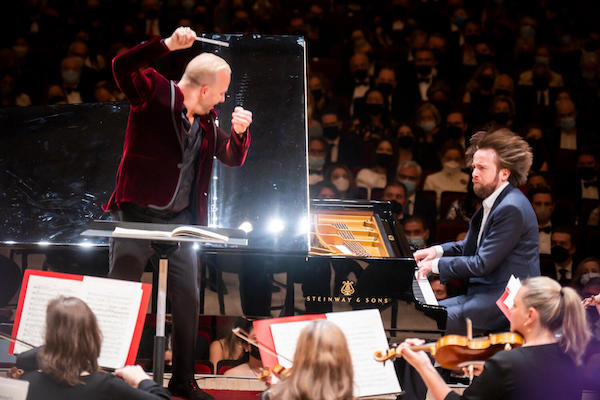Philadelphians open Carnegie season in high Yannick mode with brash Ravel, fantastic Liszt

If you ever wondered what Ravel’s La valse would sound like if John Philip Sousa had written it, the answer came Thursday at Carnegie Hall, as Yannick Nézet-Séguin and the Philadelphia Orchestra opened the fabled venue’s 2022-2023 season with a concert long on festivity and somewhat short on artistic rewards.
The selection of the turbulent, unsettling Ravel piece to open this most conventional of orchestral programs—overture, concerto, symphony, plus the obligatory three minutes of (be afraid) modern music—hinted that a brash and brassy interpretation might be in store. Nézet-Séguin and his well-drilled ensemble delivered with massive climax after massive climax, slowing down in between to gather themselves for the next assault.
It didn’t make for a very coherent or compelling account of the piece, but if the goal was to put the “unique Yannick” stamp on overly familiar music, they succeeded. In general, however, throughout the evening the music fared better when the conductor let it roll without exaggeration or tweaking.
A similarly episodic, now-for-something-completely-different approach characterized Liszt’s Piano Concerto No. 1 in E-flat major–the “triangle” concerto–as Nézet-Séguin and soloist Daniil Trifonov lingered over details at the expense of continuity. But if one is to lose the thread, who better to lose it with than the poetic young Russian pianist, with his massive fortes, dreamy pianissimos and stretchy rubato? In the spirit of a piece the composer himself called a fantasy, Trifonov’s imaginative playing sustained interest throughout, and seemed to inspire the orchestra as well.
Their teamwork reached a peak in the will-o’-the-wisp scherzo, which flew along, Trifonov’s fingers seeming to barely touch the keys, the once-notorious triangle now just a color in the gossamer orchestral texture. But not to worry–the triangle got to lead the parade in the bombastic march that followed, and an irresistible momentum propelled the performance right through the coda’s crashing octaves.
The pianist responded to the audience’s standing ovation with a favorite encore of his, a flowing, exquisitely voiced rendition of Bach’s “Jesu, Joy of Man’s Desiring,” in the piano arrangement by Myra Hess.
A virtuoso turn for the orchestra’s string sections followed, “Chasqui” from Leyendas: An Andean Walkabout by Gabriela Lena Frank, an American composer of exceptionally diverse heritage. In the piece’s three minutes there wasn’t much time to discern what was Lithuanian, Jewish or Chinese about it, but some Peruvian-style dance tunes emerged from the tumble of swift string lines (for double basses too) inspired by ancient Inca messenger-runners.
Frank’s charming piece formed a sort of bridge between the concerto’s fleet scherzo and Dvořák’s folksy Symphony No. 8 in G major, op. 88. In the first movement, the Czech composer’s paean to nature was Yannick-ized with a lot of unnatural dialing up and down of volume and tempo; even the flute’s bird call had an un-avian rubato to it. The conductor’s podium histrionics were puzzling at times; what was it about that rhythmically straightforward passage that brought on those syncopated hip bumps? Finally, however, the orchestra built steady momentum into a slam-bang coda.
The Adagio was blessed with that lush Philadelphia string sound, but its glacial ritardandos and pauses sorely needed the pick-me-up of the dainty piú animato at mid-movement. The third movement was sustained by a nice waltz lilt and the instrumental chemistry of violins swooping over burbling woodwinds. That movement’s perky finish set the table for a finale that, in its various episodes, development, and whirlaway coda, offered the most sustained and satisfying playing of the night.
The Philadelphia Orchestra conducted by Yannick Nézet-Séguin, with pianist Beatrice Rana, performs works of Ravel, Florence Price, and Clara Schumann, 8 p.m. Oct. 28 at Carnegie Hall. carnegiehall.org.